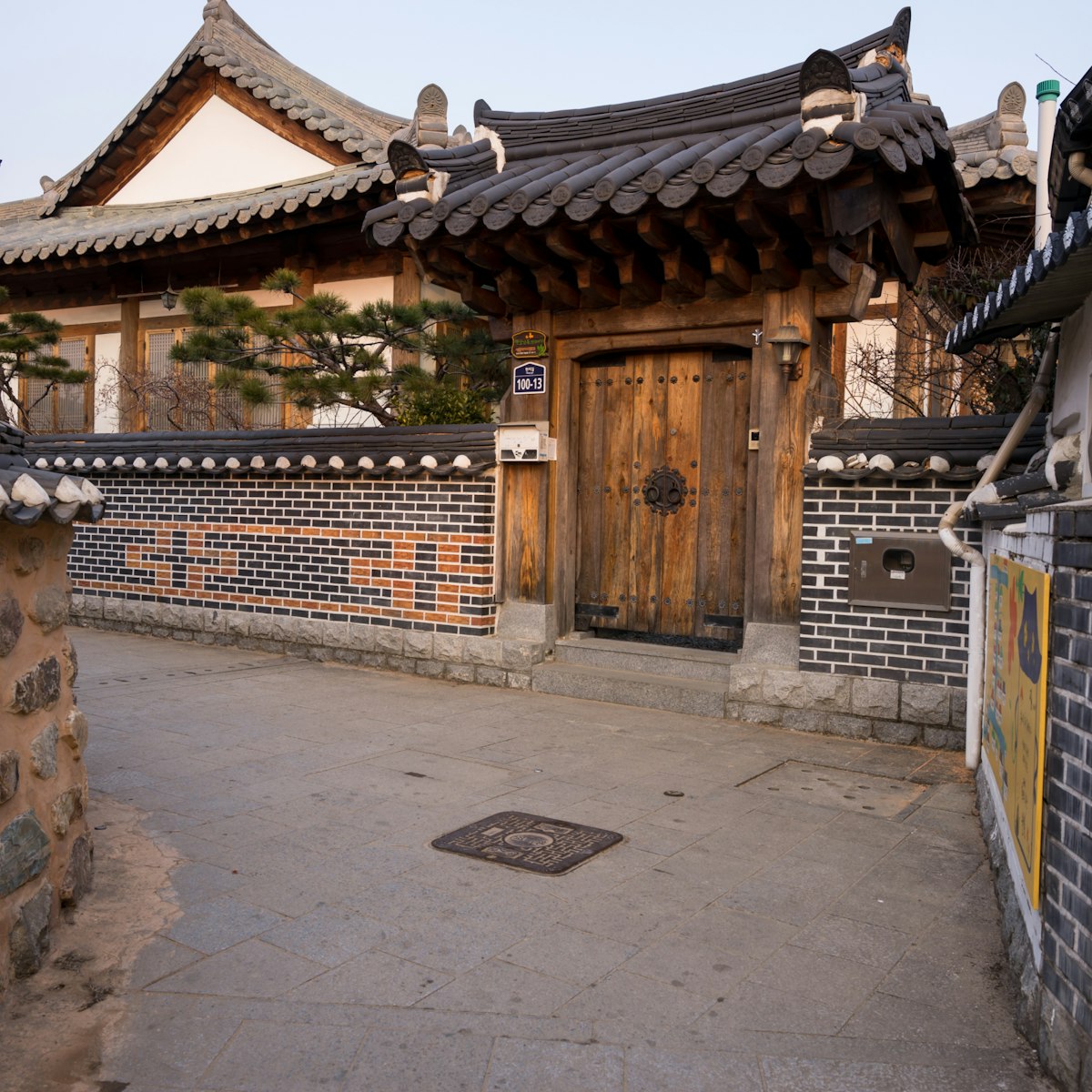
Jeonju
This maeul (village) has more than 800 hanok (traditional wooden homes), making it one of the largest such concentrations in the country. Virtually all of…

Jeonju
This maeul (village) has more than 800 hanok (traditional wooden homes), making it one of the largest such concentrations in the country. Virtually all of…

Jeollabuk-do
It's only 36m long, but it feels much longer once you reach the middle of this steel-cable bridge shooting up to the sky at a 51-degree angle. A fantastic…

Jeollabuk-do
This national park is a hiker's playground and home of Deogyusan Muju ski resort. Gucheon-dong, a small tourist village, marks the start of the park’s…

Jeollabuk-do
Compared to many temples in Jeollabuk-do, Naeso-sa is a bit underwhelming. Originally built in AD 633 and last renovated in the 19th century, its…

Jeollabuk-do
This Zen temple, founded in 577 and last rebuilt in 1720, is nestled among verdant hills. Just behind the temple is a 500-year-old camellia forest (동백 나무…

Jeollabuk-do
This park, which contains Moaksan (794m), is a popular destination for hikers on weekends. The main attraction is the temple, Geumsan-sa, which dates to…

Jeonju
The easiest landmark to find around the hanok village is a tall, red-brick church built by French missionary Xavier Baudounet where Korean Catholics were…

Jeonju
This palace is home to shrines, storehouses and guardrooms relating to the Confucian rituals once held here. There is also a replica portrait of Yi Seong…

Jeollabuk-do
Originally built during the Goryeo dynasty (918–1392), this fortress served as safety refuge for citizens during wartime. The fortress wall was built…

Jeollabuk-do
This temple has a unique sculptural garden of 80 stone towers or pinnacles that were piled up by a Buddhist mystic, Yi Kapmyong (1860–1957). Up to 15m in…

Jeollabuk-do
Hike up 30 minutes behind Seonun-sa to this giant Buddha rock carving dating to the Goryeo dynasty; the amazing image is carved into the cliff face and is…

Jeollabuk-do
Naejang-sa has an enviable location, in the centre of Naejangsan National Park and encircled by towering peaks. Though the temple dates to AD 636, the…

Jeollabuk-do
An impressive structure built in 1453, Moyang Fortress has a 1.6km-long wall surrounding a complex of reconstructed buildings, worth touring if you have a…

Jeollabuk-do
History buffs will want to stroll the hills surrounding Gochang and ponder the mystery of 440 dolmens, prehistoric tombs from the Bronze and Iron Ages now…

Jeonju
Adjacent to a modern-day paper factory, this museum covers the history and processes involved in making hanji (traditional Korean paper) and also shows…

Jeollabuk-do
The highlight here is a reconstruction of a typical Gunsan block during the 1930s, under Japanese rule. Be sure to pick up a pamphlet, which includes a…

Jeonju
This stone-and-wood gateway is all that remains of Jeonju’s fortress wall. First built in 1398 but renovated many times since, it's now the ornate…

Jeonju
Eclectic, colourful murals adorn the walls of this shantytown, on a hill overlooking Jeonju's hanok maeul. It's slowly gentrifying, meaning several spots…

Jeollabuk-do
Originally built in 1227, Anguk-sa housed a secret Joseon dynasty archive known as Sagak; later, monk soldiers lived at the temple to protect these…

Jeollabuk-do
This small beach easily fills up with inflatable tubes and tents on warm weekends. Aside from swimming, the main attraction is the nearby Chaeseokgang…

Jeonju
On a hill overlooking the entire village is a pavilion where General Yi Seong-gye celebrated a victory over Japanese pirates in 1380, prior to his…

Jeonju
Hyanggyo were neighbourhood schools established by yangban (aristocrats) in the 1500s to prepare their sons for the seowon (Confucian academies), where…

Jeonju
See sheets of hanji (handmade paper) being manufactured in this institute, housed in a gloriously atmospheric hanok (traditional wooden home) down an…

Jeollabuk-do
One of the most popular beaches on the west coast, the big draws here are the 2km stretch of white sand backed by a fir-tree forest, shellfish hunting…

Jeollabuk-do
This temple has a Dangun shrine, a centuries-old pear tree and attractive gardens, and you can even bang the big drum. Coming from the southern gate of…

Jeonju
The final resting place of Korean Catholics who were executed in 1781 and 1801. There are 13 crosses on the hillside marking the burial location and a…

Jeonju
Join Korean couples who hire paddle boats in this charming park; particularly nice are the views of lotus lilies in July.

Jeonju
Housed in a beautiful hanok (traditional wooden home), this museum has a gosori (traditional still), displays (in Korean) explaining the process of making…

Jeollabuk-do
This temple inside Moak-san Provincial Park dates to AD 599. On the left is a museum and a hall with carvings of 500 unique Buddha helpers.

Jeollabuk-do
This hermitage is a 30-minute hike from the temple Seonun-sa. Nearby is a giant Buddha rock carving dating to the Goryeo dynasty.

Jeollabuk-do
This 50m suspension bridge runs between two rocks and stands 81m above a ravine. The bridge is a short walk from the upper-level cable-car station.

Jeollabuk-do
This small museum has memorabilia on the unique solo opera musical form known as pansori. It's not far from the Moyang Fortress entrance.


Jeollabuk-do
Fairies are said to slide down rainbows to bathe in the pools at this small temple. The stone Buddha statue inside the main hall is believed to date from…

Jeollabuk-do
A 300m walk from the top of the cable car in Naejangsan National Park, this pavilion offers stunning views over the surrounding peaks.

Jeonju
This underwhelming monument commemorates one of the ancestors of Joseon dynasty founder Yi Seong-gye. It's located across the bridge from Omok-dae.

Jeollabuk-do
This hermitage, halfway up the ridge in Naejangsan National Park, is part of the Naejang-sa temple complex.

Jeollabuk-do
This tiny hermitage in the hills of Seonunsan Provincial Park is part of the temple Seonun-sa.

Jeonju
Houses the artwork and art collection of a well-known 20th-century calligrapher, Song Sung-yong (pen name, Gangam).

Jeollabuk-do
The oldest hermitage at Seonun-sa is located in the hills behind the temple.